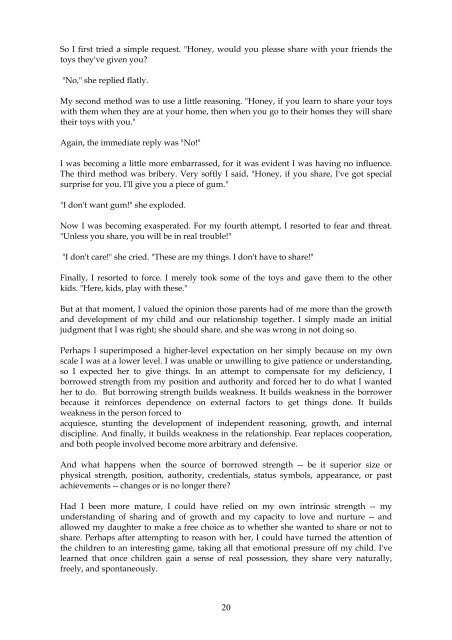Covey - The 7 habits of highly effective people
You also want an ePaper? Increase the reach of your titles
YUMPU automatically turns print PDFs into web optimized ePapers that Google loves.
So I first tried a simple request. "Honey, would you please share with your friends the<br />
toys they've given you?<br />
"No," she replied flatly.<br />
My second method was to use a little reasoning. "Honey, if you learn to share your toys<br />
with them when they are at your home, then when you go to their homes they will share<br />
their toys with you."<br />
Again, the immediate reply was "No!"<br />
I was becoming a little more embarrassed, for it was evident I was having no influence.<br />
<strong>The</strong> third method was bribery. Very s<strong>of</strong>tly I said, "Honey, if you share, I've got special<br />
surprise for you. I'll give you a piece <strong>of</strong> gum."<br />
"I don't want gum!" she exploded.<br />
Now I was becoming exasperated. For my fourth attempt, I resorted to fear and threat.<br />
"Unless you share, you will be in real trouble!"<br />
"I don't care!" she cried. "<strong>The</strong>se are my things. I don't have to share!"<br />
Finally, I resorted to force. I merely took some <strong>of</strong> the toys and gave them to the other<br />
kids. "Here, kids, play with these."<br />
But at that moment, I valued the opinion those parents had <strong>of</strong> me more than the growth<br />
and development <strong>of</strong> my child and our relationship together. I simply made an initial<br />
judgment that I was right; she should share, and she was wrong in not doing so.<br />
Perhaps I superimposed a higher-level expectation on her simply because on my own<br />
scale I was at a lower level. I was unable or unwilling to give patience or understanding,<br />
so I expected her to give things. In an attempt to compensate for my deficiency, I<br />
borrowed strength from my position and authority and forced her to do what I wanted<br />
her to do. But borrowing strength builds weakness. It builds weakness in the borrower<br />
because it reinforces dependence on external factors to get things done. It builds<br />
weakness in the person forced to<br />
acquiesce, stunting the development <strong>of</strong> independent reasoning, growth, and internal<br />
discipline. And finally, it builds weakness in the relationship. Fear replaces cooperation,<br />
and both <strong>people</strong> involved become more arbitrary and defensive.<br />
And what happens when the source <strong>of</strong> borrowed strength -- be it superior size or<br />
physical strength, position, authority, credentials, status symbols, appearance, or past<br />
achievements -- changes or is no longer there?<br />
Had I been more mature, I could have relied on my own intrinsic strength -- my<br />
understanding <strong>of</strong> sharing and <strong>of</strong> growth and my capacity to love and nurture -- and<br />
allowed my daughter to make a free choice as to whether she wanted to share or not to<br />
share. Perhaps after attempting to reason with her, I could have turned the attention <strong>of</strong><br />
the children to an interesting game, taking all that emotional pressure <strong>of</strong>f my child. I've<br />
learned that once children gain a sense <strong>of</strong> real possession, they share very naturally,<br />
freely, and spontaneously.<br />
20


